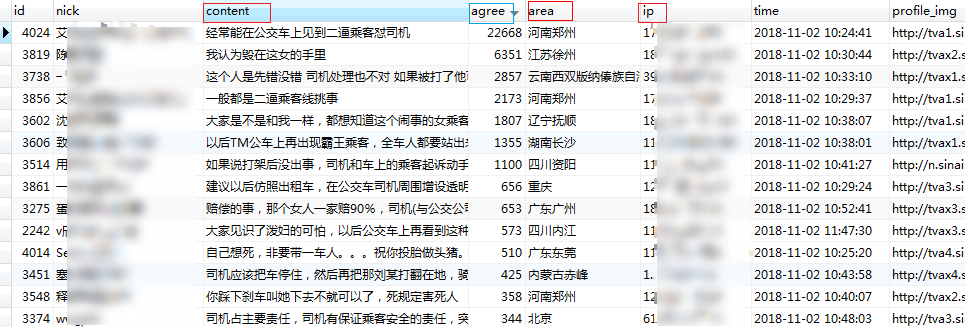輿情分析專案-重慶公交墜江原因
阿新 • • 發佈:2018-11-04
輿情分析專案
1、分析事件:重慶公交墜江原因
2、分析物件:
(1)網友評論(初級分類-分詞匹配;高階分類-自然語言識別,對映人類情感和意圖,比如:積極、消極、無奈、諷刺、建設、謾罵、理性分析、事後、和事佬等)
(2)評論者的公網IP(依據公網IP識別不同地域的網路使用者,對本次事件的關注度)
(3)評論者的省份屬性(同上)
3、資料來源:
新浪評論:http://comment5.news.sina.com.cn/comment/skin/default.html?channel=gn&newsid=comos-hnfikve6671738&group=0
4、其他:
準備資料:
(1)中國的行政區劃資料,包括全國的省、市、縣
(2)世界的國家資料
(一)輿情分析專案之資料準備:採集評論資料
1、採集欄位
三個欄位:評論、IP、省份
其他欄位:收到點贊數等等
2、Python實現資料採集
檔案結構

(1)python主程式碼
busremark.py中
import json
import requests
import pymysql
import time as timeimport
from mylog import Logger
logger1 = Logger(logfile='log1.log', logname="log1", logformat=1).getlog() # 使用自定義日誌物件
# 連線資料庫
connect = pymysql.Connect(
host='localhost',
port=3306,
user='root',
passwd='root',
db='analyze',
charset='utf8'
)
# 獲取遊標
cursor = connect.cursor()
# 建立資料庫語句
for page_num in range(1, 6001): # 從1採集到6000條評論
if page_num % 50 == 0: # 每採集50條資料,休息2秒
timeimport.sleep(2)
url = "http://comment5.news.sina.com.cn/page/info?version=1&format=js&channel=gn&newsid=comos-hnfikve6671738&group=0&compress=0&ie=utf8&oe=utf8&page=" + str(
page_num) + "&page_size=1&jsvar=loader_1541133929419_28637561"
# url = "http://comment5.news.sina.com.cn/page/info?version=1&format=js&channel=gn&newsid=comos-hnfikve6671738&group=0&compress=0&ie=gbk&oe=gbk&page=1&page_size=2&jsvar=loader_1541133929419_28637561"
headers = {
'User-Agent': 'Mozilla/5.0 (Windows NT 6.1; WOW64) AppleWebKit/537.36 (KHTML, like Gecko) Chrome/63.0.3239.132 Safari/537.36'
}
try: # 嘗試採集
# 發出請求獲取響應
response = requests.get(url, headers=headers)
data_str = response.content.decode('unicode_escape')
# 排除干擾字串
data_str = data_str.lstrip("var loader_1541133929419_28637561=")
# print(data_str)
# str轉字典
data_dict = json.loads(data_str)
print(type(data_dict))
# 獲取每次響應中的所有評論
all_remarks = data_dict['result']['cmntlist']
print(len(all_remarks))
i = 0
for c in all_remarks: # 遍歷每次響應中的評論,並存入mysql
i += 1
print(i, "*" * 100)
nick = c["nick"] # 暱稱
content = c["content"] # 評論
agree = int(c["agree"]) # 收到點贊
area = c["area"] # 地區
ip = c["ip"] # 源ip
time = c["time"] # 評論釋出時間
profile_img = c["profile_img"] # 頭像
print(nick)
print(content)
print(agree)
print(ip)
print(time)
print(profile_img)
# sql操作
# 增加資料操作
sql_1 = "insert into all_remarks(nick, content, agree, area, ip, time, profile_img) values(%s,%s,%s,%s,%s,%s,%s)"
data = (nick, content, agree, area, ip, time, profile_img)
cursor.execute(sql_1, data) # 生成增加sql語句
connect.commit() # 確認永久執行增加
except Exception as e: # 採集異常處理
my_e = str(e) + " ==> " + str(url)
logger1.warning(my_e) # 定義除錯日誌內容
# print(my_e)
continue # 忽視異常,進行後面的採集
(2)python日誌
mylog.py中
# 開發一個日誌系統, 既要把日誌輸出到控制檯, 還要寫入日誌檔案
import logging
# 用字典儲存輸出格式
format_dict = {
1: logging.Formatter('%(asctime)s - %(name)s - %(filename)s - %(levelname)s - %(message)s'),
2: logging.Formatter('%(asctime)s - %(name)s - %(levelname)s - %(message)s'),
3: logging.Formatter('%(asctime)s - %(name)s - %(levelname)s - %(message)s'),
4: logging.Formatter('%(asctime)s - %(name)s - %(levelname)s - %(message)s'),
5: logging.Formatter('%(asctime)s - %(name)s - %(levelname)s - %(message)s')
}
class Logger():
def __init__(self, logfile, logname, logformat):
'''
指定儲存日誌的檔案路徑,日誌級別,以及呼叫檔案
將日誌存入到指定的檔案中
'''
# 建立一個logger
self.logger = logging.getLogger(logname)
self.logger.setLevel(logging.DEBUG)
# 建立一個handler,用於寫入日誌檔案
fh = logging.FileHandler(logfile)
fh.setLevel(logging.DEBUG)
# 再建立一個handler,用於輸出到控制檯
ch = logging.StreamHandler()
ch.setLevel(logging.DEBUG)
# 定義handler的輸出格式
# formatter = logging.Formatter('%(asctime)s - %(name)s - %(levelname)s - %(message)s')
formatter = format_dict[int(logformat)]
fh.setFormatter(formatter)
ch.setFormatter(formatter)
# 給logger新增handler
self.logger.addHandler(fh)
self.logger.addHandler(ch)
def getlog(self):
return self.logger
if __name__ == '__main__':
logger1 = Logger(logfile='log1.txt', logname="fox1", logformat=1).getlog()
logger1.debug('i am debug')
logger1.info('i am info')
logger1.warning('i am warning')
logger2 = Logger(logfile='log2.txt', logname="fox2", logformat=2).getlog()
logger2.debug('i am debug2')
logger2.info('i am info2')
logger2.warning('i am warning2')
3、sql建表語句
/* Navicat MySQL Data Transfer Source Server : win7_local Source Server Version : 50717 Source Host : localhost:3306 Source Database : analyze Target Server Type : MYSQL Target Server Version : 50717 File Encoding : 65001 Date: 2018-11-02 17:12:24 */ SET FOREIGN_KEY_CHECKS=0; -- ---------------------------- -- Table structure for all_remarks -- ---------------------------- DROP TABLE IF EXISTS `all_remarks`; CREATE TABLE `all_remarks` ( `id` int(11) unsigned NOT NULL AUTO_INCREMENT, `nick` varchar(255) DEFAULT NULL, `content` text, `agree` int(10) DEFAULT NULL, `area` varchar(100) DEFAULT NULL, `ip` varchar(20) DEFAULT NULL, `time` datetime DEFAULT NULL ON UPDATE CURRENT_TIMESTAMP, `profile_img` varchar(255) DEFAULT NULL, PRIMARY KEY (`id`) ) ENGINE=InnoDB AUTO_INCREMENT=1 DEFAULT CHARSET=utf8;
4、效果截圖

以上工作僅實現了主要資料的準備,還有一些省份資料、國家名資料的準備。
之後就可以開始做資料分析了。
未完待續,敬請期待。
